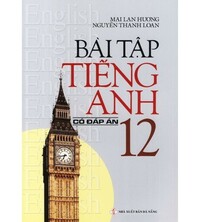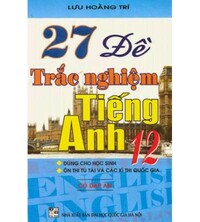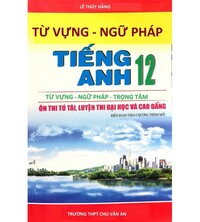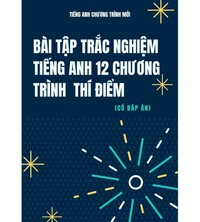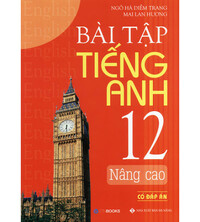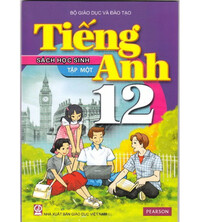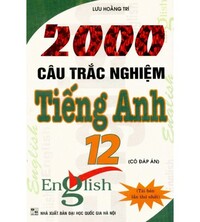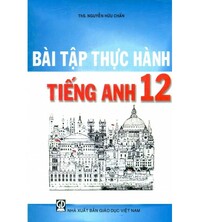Đề số 3 - Đề kiểm tra cuối kì 1- Tiếng Anh 12 mới
Đáp án và lời giải chi tiết Đề số 3 - Đề kiểm tra cuối kì 1- Tiếng Anh 12 mới
Đề bài
Pick out the word whose underlined part is pronounced differently from that of the others.
1. A. prepared B. called C. expressed D. employed
2. A. should B. young C. couple D. rough
3. A. possible B. company C. job D. responsible
Choose the word that has the stress differently from that of the other words.
4. A. experience B. concentrate C. enthusiasm D. certificate
5. A. interview B. interviewee C. interviewer D. industry
Choose the best answer to complete the blank in the following sentence.
6. In Vietnam, application forms for the National Entrance Examinations must be __________before the deadline, often in April.
A. issued B. signed C. filed D. submitted
7. Points will be added to the Entrance Examination scores for those who hold an excellent high school__________.
A. certificate B. diploma C. qualification D. degree
8. AIDS is a/an ___________disease.
A. endanger B. dangerous C. endangered D. danger
9. If the lecturer last night __________Dr. Mason, I would have listened carefully.
A. were B. would be C. was D. had been
10. I had a road accident when I _______a phone call in the car.
A. was making B. have made C. made D. am making
11. This room _______since I was born.
A. has been painted B. Painted C. was pained D. has painted
12. You are old enough. I think it's high time you _______ for a job.
A. apply B. applied C. will apply D. are applying
13. Jim: “ This dictionary is for you. I hope you will find it useful.” Mai : " ______________."
A. Thanks. I’ll do it B. Thanks. It’s very kind of you
C. Yes, please D. No problem!
Kiến thức: Giao tiếp
A. Thanks. I’ll do it: Cảm ơn. Tôi sẽ làm nó
B. Thanks. It’s very kind of you: Cảm ơn. Bạn thật tốt bụng
C. Yes, please: Vâng, xin vui lòng
D. No problem!: Không sao!
14. In Britain women usually retire _______the age of 60.
A. at B. on C. by D. in
15. He read The Old Man and The Sea, a novel __________by Ernest Hemingway.
A. written B. writing C. which wrote D. that written
16. Lien passed the oral test, __________pleased her parents. VDC
A. that B. which C. what D. it
17. John is _______only child in his family, so his parents love him a lot.
A. no article B. the C. a D. an
18. In many cultures, people signify their agreement by _______their head.
A. nodding B. turning C. pointing D. raising
19. These new laws have laid legal grounds for __________inefficient co-operatives.
A. dissolving B. analyzing C dividing D. disarming.
20. With the strong __________of our party and Government to DoiMoi, we believe that we will build a better life for our people. TH
A. promise B. commitment C. investment D. reaffirm
21. It’s usually difficult __________a place to park in the city center.
A. finding B. to find C. find D. to finding.
22. It took me a long time to __________wearing glasses.
A. get used to B. use to C. used to D. use
23. Let’s have this letter __________by express mail.
A. sends B. send C. being sent D. sent
24. “Can I help you?” _ “ ___________”.
A. No, thanks. I’m just looking B. No, I’m seeing
C. Yes, I’m watching D. Yes, I’m thinking
25. –Will they get married? - Yes, definitely __________their differences.
A. however B. despite C. owing to D. although
26. Let’s go to the station to see her __________.
A. through B. back C. off D. to
27. He spoke confidently and that impressed me.
A. The thing which impressed me was the confident way he spoke.
B. He spoke confidently, which impressed me.
C. The confident way in which he spoke impressed me.
D. All are correct.
Listen and choose the best answer. You can listen to the audio twice
28. Why do some young people want to find a job after they leave school?
A. They are badly in need of money B. They want to get rid of schooling
C. Their parents do not help them D. They want to lead an independent life
29. What attitude do some young people have when they are faced with difficulty?
A. They just let things go B. They make good efforts
C. They become discouraged D. They complain about their parents and teachers
30. Which of these following is NOT mentioned concerning young people starting work?
A. Anxiety B. Encouragement C. Fear D. Poor preparation
31. The main idea of the speech is ____________.
A. Learning at university B. Making an important decision.
C. Starting to work after leaving school D. Getting to know about new jobs
Choose the word or phrase ( A, B, C or D ) that best fits the blank space in the following passage.
What do you do well? What do you enjoy doing? Your answers to these two questions will help you identify your (31) ___. An employer will consider you seriously for a (32)___ when you can show them that you know who you are, what you can offer and which you have studied. Sometimes it is difficult to know what your weaknesses are. Clearly not everyone is equally good (33) ___ everything. You may need to improve yourself and so (34) ___courses in that field could turn a weakness into strength.
You will need to (35) ___some time on your self-assessment. Your honesty and the desire for self-improvement will lead to success in getting the right job. Explore the following seven areas to start to get to know yourself: your aptitude, your skills, your personality, the level of responsibility you feel comfortable with, your interests and your needs.
32. A. strong B. strength C. strengthen D. strengthened
33. A. position B. location C. spot D. room
34. A. upon B. in C. at D. for
35. A. meeting B. taking C. choosing D. interviewing
36. A. use B. make C. lose D. spend
Read the passage below and choose the best answer (A, B, C or D ) to each question.
Higher education, also called tertiary, third stage or post secondary education, is the non-compulsory educational level following the completion of a school providing a secondary education, such as a high school, secondary school. Tertiary education is normally taken to include undergraduate and postgraduate education, as well as vocational education and training. Colleges and universities are the main institutions that provide tertiary institutions. Tertiary education generally results in the receipt of certificates, diplomas, or academic degrees.
Higher education includes teaching, research and social services activities of universities, and within the realm of teaching, it includes both the undergraduate level and the graduate level. Higher education in that country generally involves work towards a degree-level or foundation degree qualification. It is therefore very important to national economies, both as a significant industry in its own right, and as a source of trained and educated personnel for the rest of the economy.
37. What is ‘tertiary education’?
A. Primary education B. higher education
C. Secondary education D. children education
38. Where can we find tertiary education?
A. Colleges and high schools B. universities and institutes
C. Colleges and universities D. high schools and universities
39. The word ‘degree’ in paragraph 1 refers to __________.
A. a unit for measuring angles
B. a unit for measuring temperature
C. the qualification
D. a level in a scale of how serious something is
40. _________is important to national economies.
A. Qualification B. Foundation C. Schooling D. Higher education
Lời giải chi tiết
1. Kiến thức: Phát âm –ed
A. prepared /prɪˈpeəd/
B. called /kɔːld/
C. expressed /ɪksˈprɛst/
D. employed /ɪmˈplɔɪd/
Đáp án C đọc là /t/, các đáp án còn lại đọc là /d/
2. Kiến thức: Phát âm
A. should /ʃʊd/
B. young /jʌŋ/
C. couple /ˈkʌpl/
D. rough /rʌf/
Đáp án A đọc là /ʊ/, các đáp án còn lại đọc là /ʌ/
3. Kiến thức: Phát âm
A. possible /ˈpɒsəbl/
B. company /ˈkʌmpəni/
C. job /ʤɒb/
D. responsible /rɪsˈpɒnsəbl/
Đáp án B đọc là /ʌ/, các đáp án còn lại đọc là /ɒ/
Choose the word that has the stress differently from that of the other words.
4. Kiến thức: Trọng âm
A. experience /ɪksˈpɪərɪəns/
B. concentrate /ˈkɒnsəntreɪt/
C. enthusiasm /ɪnˈθjuːzɪæzm/
D. certificate /səˈtɪfɪkeɪt/
Đáp án B có trọng âm rơi âm thứ 1, các đáp án còn lại rơi âm thứ 2
5. Kiến thức: Trọng âm
A. interview /ˈɪntəvjuː/
B. interviewee /ˌɪntəvju(ː)ˈiː/
C. interviewer /ˈɪntəvjuːə/
D. industry /ˈɪndəstri/
Đáp án B có trọng âm rơi âm thứ 3, các đáp án còn lại rơi âm thứ 1
Choose the best answer to complete the blank in the following sentence.
6. Kiến thức: từ vựng
issue (v) phát hành, lưu hành
sign (v) kí tên, đăng kí
file (v) sắp xếp (văn bản, giấy tờ)
submit (v) giao, nộp
Dựa vào ngữ cảnh câu, đáp án D phù hợp về nghĩa nhất
=> In Vietnam, application forms for the National Entrance Examinations must be signed before the deadline, often in April.
Tạm dịch: Việt Nam, đơn đăng ký cho Kỳ thi tuyển sinh quốc gia phải được ký trước thời hạn, thường là vào tháng Tư.
7. Kiến thức: Từ vựng
certificate (n) bằng, chứng chỉ ( của học viện, trung tâm cấp)
diploma (n) học bạ
qualification (n) trình độ
degree (n) bằng đại học
=> Points will be added to the Entrance Examination scores for those who hold an excellent high school diploma.
Tạm dịch: Những người có bằng tốt nghiệp trung học phổ thông loại giỏi sẽ được cộng điểm.
8. Kiến thức: Từ loại
endanger (n) gây nguy hiểm
dangerous (adj) nguy hiểm
endangered (adj) có nguy cơ tuyệt chủng
danger (n) mối nguy hiểm
Vị trí cần điền là một tính từ vì nó bổ nghĩa cho danh từ disease => loại A, D
Dựa vào ngữ cảnh câu, đáp án B phù hợp nhất
=> AIDS is a/an dangerous disease.
Tạm dịch: AIDS là một căn bệnh nguy hiểm.
9. Kiến thức: câu điều kiện loại 3
Ta thấy mệnh đề chính chia ở dạng would have Vp2 nên đây là câu điều kiện loại 3 dùng để diễn tả những tình huống không có thực ở quá khứ
Cấu trúc: If + S + had + Vp2, S + would have Vp2
=> If the lecturer last night had been Dr. Mason, I would have listened carefully.
Tạm dịch: Nếu người giảng tối qua là Tiến sĩ Mason, tôi sẽ lắng nghe một cách cẩn thận.
10. Kiến thức: Thì quá khứ tiếp diễn
Sử dụng thì quá khứ tiếp diễn để diễn tả hành động đang xảy ra trong quá khứ thì có hành động khác xen vào
Cấu trúc: When S + was/ were Ving , S + V quá khứ đơn
=> I had a road accident when I was making phone call in the car.
Tạm dịch: Tôi đã gặp tai nạn trên đường khi đang gọi điện trong xe hơi.
11. Kiến thức: Thì hiện tại hoàn thành
Dấu hiệu nhận biết: since + mốc thời gian => sử dụng thì hiện tại hoàn thành
Ta thấy đây là câu bị động vì chủ ngữ (this room) không thể trực tiếp thực hiện hành động (paint)
Cấu trúc: S + have/ has been + Vp2
=> This room has been painted since I was born.
Tạm dịch: Căn phòng này đã được sơn từ khi tôi sinh ra.
12. Kiến thức: Chia động từ
Cấu trúc: It’s (high) time + S + V quá khứ đơn
=> You are old enough. I think it's high time you applied for a job.
Tạm dịch: Bạn đã đủ lớn. Tôi nghĩ rằng đã đến lúc bạn nộp đơn xin việc.
13. Kiến thức: Ngôn ngữ Giao tiếp
A. Thanks. I’ll do it: Cảm ơn. Tôi sẽ làm nó
B. Thanks. It’s very kind of you: Cảm ơn. Bạn thật tốt bụng
C. Yes, please: Vâng, xin vui lòng
D. No problem!: Không sao!
Dựa vào ngữ cảnh đoạn hội thoại, đáp án B phù hợp về nghĩa nhất
=> Jim: “ This dictionary is for you. I hope you will find it useful.” - Mai : " Thanks. It’s very kind of you”
14. Kiến thức: Giới từ at the age of …: ở tuổi…
=> In Britain women usually retire at the age of 60.
Tạm dịch: Ở Anh, phụ nữ thường nghỉ hưu ở tuổi 60.
15. Kiến thức: Rút gọn mệnh đề quan hệ
Khi rút gọn mệnh đề quan hệ:
- Nếu mệnh đề ở thể chủ động, ta bỏ đại từ quan hệ và biến đổi động từ thành Ving
- Nếu mệnh đề ở thể chủ động, ta bỏ đại từ quan hệ và biến đổi động từ thành Vp2
Ta thấy mệnh đề quan hệ trong câu này ở thể bị động vì danh từ a novel không thể trực tiếp thực hiện hành động write và cụm từ by Ernest Hemingway
=> He read The Old Man and The Sea, a novel written by Ernest Hemingway.
Tạm dịch: Ông đã đọc The Old Man and The Sea, một cuốn tiểu thuyết do Ernest Hemingway viết.
16. Kiến thức: Mệnh đề quan hệ
Sử dụng đại từ which trong mệnh đề quan hệ không xác định để thay thế cho cả một mệnh đề phía trước
=> Lien passed the oral test, which pleased her parents.
Tạm dịch: Liên đã vượt qua bài kiểm tra miệng khiến bố mẹ cô hài lòng.
17. Kiến thức: Mạo từ
a/ an đứng trước danh từ số ít được nhắc đến lần đầu
the đứng trước danh từ xác định
Ta thấy mạo từ cần tìm phải là “the” vì phía sau đó có từ “only” (duy nhất) mang tính xác định
=> John is the only child in his family, so his parents love him a lot.
Tạm dịch: John là con một trong gia đình nên được bố mẹ cưng chiều hết mực.
18. Kiến thức: Từ vựng
nod (v) gật đầu
turn (v) quay
point (v) chỉ
raise (v) nâng
Dựa vào ngữ cảnh câu, đáp án A phù hợp về nghĩa nhất
=> In many cultures, people signify their agreement by nodding their head.
Tạm dịch: Trong nhiều nền văn hóa, mọi người biểu thị sự đồng ý của họ bằng cách gật đầu.
19. Kiến thức: Từ vựng
dissolve (v) giải quyết
analyze (v) phân tích
divide (v) chia
disarm (v) giải giới
Dựa vào ngữ cảnh câu, đáp án A phù hợp về nghĩa nhất
=> These new laws have laid legal grounds for dissolving inefficient co-operatives.
Tạm dịch: Những luật mới này đã tạo cơ sở pháp lý cho việc giải thể các tập thể hoạt động kém hiệu quả.
20. Kiến thức: Từ vựng
promise (n) lời hứa
commitment (n) lời cam kết
investment (n)
reaffirm (v) khẳng định lại
Dựa vào ngữ cảnh câu, đáp án B phù hợp về nghĩa nhất
=> With the strong commitment of our party and Government to DoiMoi, we believe that we will build a better life for our people.
Tạm dịch: Với cam kết mạnh mẽ của Đảng và Chính phủ đối với DoiMoi, chúng tôi tin tưởng sẽ xây dựng cuộc sống tốt đẹp hơn cho người dân.
21. Kiến thức: to V/ Ving
Cấu trúc: It is adj to V…: thật … để làm gì
=> It’s usually difficult to find a place to park in the city center.
Tạm dịch: Thông thường, rất khó để tìm một nơi đỗ xe ở trung tâm thành phố.
22. Kiến thức: get used to/ used to
Cấu trúc: used to V: thường làm gì (trong quá khứ)
get used to Ving: dần làm quen với việc gì
=> It took me a long time to get used to wearing glasses.
Tạm dịch: Tôi phải mất một thời gian dài để quen với việc đeo kính.
23. Kiến thức: Câu cầu khiến
Cấu trúc:
Chủ động: have sb do sth: nhờ ai đó làm việc gì
Bị động: have sth done (by sb): có thứ gì được làm gì
=> Let’s have this letter sent by express mail.
Tạm dịch: Hãy gửi bức thư này qua đường chuyển phát nhanh.
24. Kiến thức: giao tiếp
"Tôi có thể giúp gì cho quý khách?" _ “___________”.
A. Không, cảm ơn. Tôi chỉ đang ngắm B. Không, tôi đang thấy
C. Có, tôi đang xem D. Có, tôi đang suy nghĩ
Ta thấy ngữ cảnh cuộc hội thoại là ở trong một cửa hàng mà người nhân viên đang giúp đỡ khách hàng.
=> Đáp án A phù hợp về nghĩa nhất
25. Kiến thức: Liên từ
However + mệnh đề: tuy nhiên
Despite + N/ Ving: mặc dù
Owing to + N: do, bởi vì
Although+ mệnh đề : mặc dù
Ta thấy sau vị trí cần điền là một danh từ (their dfferences) nên đáp án phù hợp là B, C
Dựa vào ngữ cảnh câu, đáp án B phù hợp về nghĩa nhất
=> –Will they get married? - Yes, definitely despite their differences.
Tạm dịch: –Họ sẽ kết hôn? - Có, chắc chắn là bất chấp sự khác biệt của họ.
26. Kiến thức: Giới từ
see through : nhìn thấu, nhìn qua
see back : nhìn lại
see off: tiễn
see to: sai ngữ pháp
Dựa vào ngữ cảnh câu, đáp án C phù hợp về nghĩa nhất
=> Let’s go to the station to see her off.
Tạm dịch: Hãy đến nhà ga để tiễn cô ấy.
27. Kiến thức: Đại từ quan hệ
A. The thing which impressed me was the confident way he spoke.
(Điều khiến tôi ấn tượng là cách anh ấy nói rất tự tin.)
=> Sử dụng đại từ which thay thế cho danh từ “the thing”
B. He spoke confidently, which impressed me.
(Anh ấy nói một cách tự tin, điều đó làm tôi ấn tượng.)
=> Sử dụng đại từ which trong mệnh đề quan hệ không xác định (sau dấu phẩy) để thay thế cho ý nghĩa của cả mệnh đề đứng trước
C. The confident way in which he spoke impressed me.
(Cách nói chuyện đầy tự tin của anh ấy khiến tôi ấn tượng.)
=> sử dụng đại từ quan hệ which để thay thế cho danh từ “the confidence way” và đảo giới từ “in” lên trước đại từ quan hệ
=> Cả 3 đáp án đều đúng
Listen and choose the best answer. You can listen to the audio twice
28. Kiến thức: Nghe hiểu
Tại sao một số bạn trẻ muốn tìm việc làm sau khi ra trường?
A. Họ đang rất cần tiền B. Họ muốn bỏ học
C. Cha mẹ của họ không giúp đỡ họ D. Họ muốn có một cuộc sống tự lập
Thông tin: Many school leavers are eager to go to work in order to make money to live independently and help their parents.
Tạm dịch: Nhiều học sinh vừa ra trường mong muốn đi làm thêm kiếm tiền để sống tự lập và phụ giúp cha mẹ.
29. Kiến thức: Nghe hiểu
Một số thanh niên có thái độ như thế nào khi gặp khó khăn?
A. Họ chỉ để mọi thứ trôi qua B. Họ nỗ lực tốt
C. Họ trở nên chán nản D. Họ phàn nàn về cha mẹ và giáo viên của họ
Thông tin: They always do their best to overcome any obstacles they may encounter.
Tạm dịch: Họ luôn nỗ lực hết mình để vượt qua mọi trở ngại mà họ có thể gặp phải.
30. Kiến thức: Nghe hiểu
Thông tin: Unfortunately, owing to the guidance which is poor and biased from their parents and teachers, most boys and girls are ill-prepared for employment. Therefore, they often feel worried and build up all sorts of fearsome prospects in their mind as the time to start work gets nearer.
Tạm dịch: Thật không may, do sự hướng dẫn thiếu chặt chẽ và thiên vị của cha mẹ và giáo viên của các em, hầu hết các em nam và nữ đều chưa chuẩn bị tốt cho việc làm. Do đó, họ thường cảm thấy lo lắng và hình thành đủ thứ viễn cảnh đáng sợ trong đầu khi thời gian bắt đầu công việc càng gần.
31. Kiến thức: Nghe hiểu
Ý chính của bài phát biểu là ____________.
A. Học ở trường đại học B. Ra quyết định quan trọng.
C. Bắt đầu làm việc sau khi rời trường D. Tìm hiểu về công việc mới
Dựa vào các câu hỏi phía trước và tóm tắt nội dung bài nói, ta thấy tác giả đang tập trung nói về mục đích làm việc sau khi tốt nghiệp và các tình huống lập nghiệp của giới trẻ.
Transcripts:
Students at the age of 18 always have to face a difficult decision to make. Some want to go on with their study at college or university, others prefer to start work immediately. Many school leavers are eager to go to work in order to make money to live independently and help their parents. They always do their best to overcome any obstacles they may encounter. Unfortunately, owing to the guidance which is poor and biased from their parents and teachers, most boys and girls are ill-prepared for employment. Therefore, they often feel worried and build up all sorts of fearsome prospects in their mind as the time to start work gets nearer. It is the duty of the school and family to prepare these young people for their future jobs.
Choose the word or phrase ( A, B, C or D ) that best fits the blank space in the following passage.
32. Kiến thức: từ loại
strong (adj) mạnh, khỏe
strength (n) sức mạnh
strengthen (v) làm tăng sức mạnh
strengthened (adj) được cường hóa, tăng sức mạnh
Vị trí cần điền là một danh từ vì phía trước nó là một tính từ sở hữu (your)
=> Your answers to these two questions will help you identify your strength.
Tạm dịch: Câu trả lời của bạn cho hai câu hỏi này sẽ giúp bạn xác định được sức mạnh của mình.
33. Kiến thức: Từ vựng
position (n) vị trí (địa vị)
location (n) vị trí (địa lí)
spot (n) điểm
room (n) phòng
Dựa vào ngữ cảnh câu, đáp án A phù hợp nhất
=> An employer will consider you seriously for a position when you can show them that you know who you are, what you can offer and which you have studied.
Tạm dịch: Nhà tuyển dụng sẽ xem xét bạn một cách nghiêm túc cho một vị trí khi bạn có thể cho họ thấy rằng bạn biết bạn là ai, bạn có thể cung cấp những gì và bạn đã nghiên cứu điều gì.
34. Kiến thức: Giới từ
Ta có: be good at N/ Ving: giỏi về cái gì
=> Clearly not everyone is equally good at everything.
Tạm dịch: Rõ ràng không phải ai cũng giỏi như nhau trong mọi việc.
35. Kiến thức: Từ vựng
meet (v) gặp gỡ
take (v) lấy
choose (v) chọn
interview (v) phỏng vấn
Ta có take courses: tham gia khóa học
=> You may need to improve yourself and so taking courses in that field could turn a weakness into strength.
Tạm dịch: Bạn có thể cần phải cải thiện bản thân và do đó, tham gia các khóa học trong lĩnh vực đó có thể biến điểm yếu thành điểm mạnh.
36. Kiến thức: Từ vựng
use (v) sử dụng
make (v) làm
lose (v) làm mất, đánh mất
spend (v) để dành
Cấu trúc: spend time on N/ Ving: dành thời gian cho
=> You will need to spend some time on your self-assessment.
Tạm dịch: Bạn sẽ cần dành một chút thời gian để tự đánh giá bản thân.
37. Kiến thức: Từ vựng tertiary education (n) giáo dục đại học/ cao đẳng
Primary education (n) giáo dục tiểu học
Secondary school (n) giáo dục trung học cơ sở
Higher education (n) giáo dục sau trung học phổ thông
Chidren education (n) giáo dục trẻ em (mầm non)
=> tertiary education = higher education
38. Kiến thức: Đọc hiểu
Chúng ta có thể tìm thấy giáo dục đại học ở đâu?
A. Các trường cao đẳng và trung học B. các trường đại học và học viện
C. Cao đẳng và đại học D. các trường trung học và đại học
Thông tin: Tertiary education is normally taken to include undergraduate and postgraduate education, as well as vocational education and training. Colleges and universities are the main institutions that provide tertiary institutions.
Tạm dịch: Giáo dục đại học thường được thực hiện để bao gồm giáo dục đại học và sau đại học, cũng như giáo dục và đào tạo nghề. Các trường cao đẳng và đại học là những cơ sở chính cung cấp các cơ sở giáo dục đại học.
39. Kiến thức: Đọc hiểu
Từ ‘độ’ trong đoạn 1 đề cập đến __________.
A. một đơn vị đo góc
B. một đơn vị đo nhiệt độ
C. trình độ
D. một mức trong thang đo mức độ nghiêm trọng của một điều gì đó
Thông tin: Tertiary education generally results in the receipt of certificates, diplomas, or academic degrees.
Tạm dịch: Giáo dục đại học thường dẫn đến việc nhận được các chứng chỉ, bằng tốt nghiệp hoặc bằng cấp.
Ta có: academic degree : bằng cấp, bằng
40. Kiến thức: Đọc hiểu
_________ rất quan trọng đối với nền kinh tế quốc gia.
A. Bằng cấp B. Nền tảng C. Đi học D. Giáo dục đại học
Thông tin: Higher education in that country generally involves work towards a degree-level or foundation degree qualification. It is therefore very important to national economies, both as a significant industry in its own right, and as a source of trained and educated personnel for the rest of the economy.
Tạm dịch: Giáo dục đại học ở quốc gia đó thường liên quan đến công việc hướng tới một văn bằng cấp bằng cấp hoặc bằng cấp cơ sở. Do đó, nó rất quan trọng đối với các nền kinh tế quốc gia, vừa là một ngành công nghiệp quan trọng theo đúng nghĩa của nó, vừa là nguồn cung cấp nhân lực được đào tạo và giáo dục cho phần còn lại của nền kinh tế.
Search google: "từ khóa + timdapan.com" Ví dụ: "Đề số 3 - Đề kiểm tra cuối kì 1- Tiếng Anh 12 mới timdapan.com"
